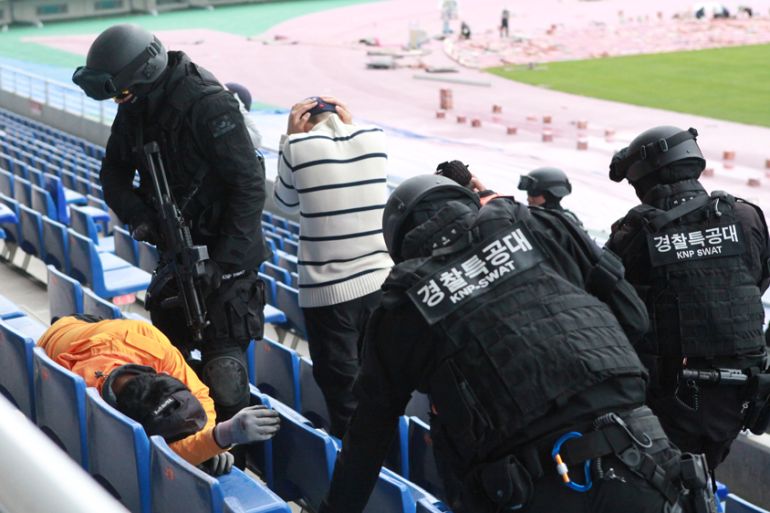South Korea plans a “K-Police Wave”
After K-pop, could Korean policing be the country’s next export?

We’ve all watched Psy’s sensational “Gangnam Style” and the rising popularity of Korean pop culture including music, dramas, and movies across Asia and beyond, which gave birth to the term hallyu or “Korean Wave”. Now, South Korean police hope to mirror this success by creating their own “K-Police Wave”.
South Korea’s police are looking to export their homegrown expertise in dealing with terrorism, cyber threats and mass demonstrations to the world through a new, dedicated task force.
Recent protests in central Seoul have highlighted the refined tactics and equipment of the police, who’ve prevented protesters from marching beyond permitted areas and breaching the presidential palace.
Last Sunday, an unexpectedly large gay pride parade took place in central Seoul despite months of persistent opposition from conservative Christian groups, with many anticipating possible clashes between the tens of thousands of parade participants and the estimated 9,400 anti-gay protesters who turned up on the day.
![South Korean police forces and barricades prevented anti-gay protesters from disrupting Seoul's gay pride parade on Sunday, June 28 [AFP/Getty Images]](/wp-content/uploads/2015/07/97e1a7241945404c9f4f38e7f113f766_18.jpeg)
The police set up long, impenetrable walls using buses and mobile fences and mobilised 4,000 officers to effectively insulate the parade participants from the protesters, ensuring a peaceful and uninterrupted march. When some protestors tried to sneak into the parade, they were stopped by the police.
Kim Seong-gun, head of the foreign affairs bureau at the Korean National Policy Agency, acknowledged the criticisms surrounding the excessive use of force against pro-democracy protesters in the past—tear gas, for instance, was used until the 1990s—but stressed that past violence prompted them to develop techniques and equipment under the principle that no one, be it police or protesters, should get hurt if potential clashes are minimised in the first place.
Over time, police tactics have become defensive and choreographed. They now use barriers, such as buses parked back-to-back, to control protestors, and use water cannons if crowds become aggressive. They record all this using small cameras so that there’s evidence if police or protestors do anything illegal.
Besides the maintenance of public order, many countries in the Middle East, Asia, Africa and Latin America are looking to South Korea’s capabilities in the fields of cyber security, anti-terrorism and scientific investigation such as DNA analysis.
According to the police, the percentage of unresolved cases involving violent crimes remains low due to investigative methods such as DNA analysis. In 2013, police say 97.6% of murder cases were solved.
In particular, South Korea, being an IT powerhouse and faced with a formidable enemy, North Korea, has accumulated know-how in cyber security and anti-terrorism.
Nearly 200 officers from about two dozen countries have been invited to attend exchange programs in 2015. The police are currently running the International Police Cooperation Center where they’re sharing counter-terrorism intelligence and carrying out field operations with officers from 15 countries including Serbia, Iran, Colombia and Afghanistan, to maintain security at the upcoming 2015 Summer Universiade taking place in the city of Gwangju.
![Police officers from 15 countries including Serbia, Afghanistan, Iran, Sri Lanka, Colombia and Vietnam receive counter-terrorism training at the International Police Cooperation Center [Korean National Police Agency]](/wp-content/uploads/2015/07/ade744f388c0473d9a5a66df31864df5_18.jpeg)
However, there are criticisms that the exporting drive could assist authoritarian governments to stifle legitimate dissent in other countries and harm South Korea’s reputation.
Kim, at the Korean National Policy Agency, told Al Jazeera that countries looking to adopt more humane policing measures want to learn from South Korea.
Exporting policing tactics would also benefit Koreans living abroad, Kim added.
“Now, there are so many South Koreans living overseas. The South Korean police cannot go overseas and directly protect them. But, by spreading our excellent police techniques to other countries, we hope to ensure the safety of our overseas South Koreans as well.”